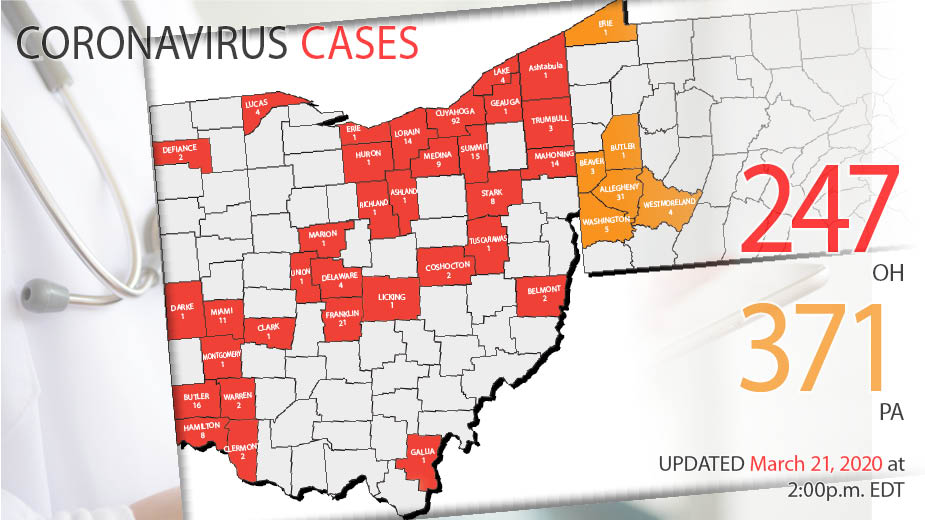DeWine: Critical Time to Stop Spread of COVID-19
COLUMBUS, Ohio – Gov. Mike DeWine made an impassioned plea to Ohioans Saturday to adhere to health officials’ directives to stay at home to stop the spread of the novel coronavirus. “We control our own destiny,” he said.
“This is a critical time and there are actions we must take. What we do now and what we do not do now will really determine how many Ohioans will die.”
DeWine ordered the closure of adult day centers for individuals with developmental disabilities and Lt Gov. Joh Husted announced the Bureau of Worker’s Compensation will allow public and private businesses to defer payments for March, April and May until at least June 1, leaving $200 million in the economy.
The Ohio Department of Transportation also is granting waivers for weight and size measurements for trucks to allow hauling larger loads of essential goods to grocery stores and medical suppliers, according to Husted.
Ohio Department of Health Director Dr. Amy Acton said the state has three confirmed deaths from COVID-19 and multiple deaths are under investigation and have already been reported to the media, but haven’t been reported to the state’s data center. The number on confirmed cases has risen to 247.
“We have 58 people hospitalized, multiple in ICU. We are taking people off of ventilators in Ohio,” Acton said.
Acton clarified that doctors are not having to choose as to whom gets a ventilator in patients with COVID-19.
“No, we are not at that point in Ohio, thank goodness. Everything we’re doing and everything we’re asking of you is so we never get to that point,” Acton said.
The state is compiling numbers, taking inventories, repurposing equipment, cancelling elective surgeries, and has a plan for stockpiling ventilators to avoid having to make difficult decisions. She points out the Center for Disease Control and Prevention has issued considerations for ethical decisions in the use of ventilators and guidelines for stockpiling.
“At this stage we haven’t been able to follow somebody through to full recovery, but if you look at the areas where they’re ahead of us, we certainly will be seeing that in days to come,” said Acton
Of those who contract COVID-19, 80% of people will recover at home. The expected recovery time is two weeks, she said.
“We are early on in our illnesses and deaths. I have not had those case stories of people. … but we will be seeing more deaths, we expect that as part of this spreading and more and more people becoming infected. And there are folks who, despite all heroic measures, are not going to make it with this,” Acton somberly said.
As far as the availability of tests for coronavirus, the health director said a health alert was sent to primary doctors Friday outlining a tiered plan. She reiterated testing is only being done on the sickest people in hospitals and health care works due to extreme shortages.
“What I want you to do in Ohio is assume you may be asymptomatic, or even if you have it, the test will not change how we’re going to help you get through it,” Acton said.
“Ohioans, I want you to know that every ounce of test we have, every nasal swab, everything is being maximized in Ohio. It’s complicated and it’s no one’s fault. It’s not something that we did in Ohio to not have this capability. My job and the hard, hard decision is using what we have while we have it,” shen said.
With hospitals at 75% to 80% occupancy across the state and a prediction of surge in cases, hospitals are making contingency and triage plans for an influx of people presenting at emergency departments and identifying spaces for overflow patients.
Acton said some areas are considering smaller hospitals or former hospitals that have closed. DeWine said National Guard troops have been erecting tents in some communities.
The order to close adult day venters for people who have developmental disabilities was done to keep vulnerable populations safe, DeWine said. The governor had already closed all bars and restaurants, schools, senior centers, fitness facilities, hair and nail salons, and banned gatherings of 50 or more people, but delayed closing developmental disability centers until in-home services were secured.
“Today we can say they will get the services and provisions they need,” the governor said, explaining that 26,000 individuals who have developmental disabilities attend centers daily for group-based services such as work training, social and recreational activities and skill-building sessions. Groups ranged from four people in a center to more than 100.
“We know large numbers are not good and pose a danger to them,” he said. “This has a been a challenge because we were making sure each one of them could get the services they need.”
DeWine talked about receiving texts from people around the state last week reporting bars being open and large congregations of people. He said he would discuss the situation today.
More messages were sent to the governor Saturday morning, saying it looked like a regular saturday afternoon where they were.
“We can’t have anymore regular Saturday mornings for a while, just like we can’t have any more Saturday nights,” he said. “This is a silent invader because people don’t even know if they have it. I’m going to ask you that when you go to bed, ask yourself if you’ve done everything you could do to protect us?”
Copyright 2024 The Business Journal, Youngstown, Ohio.



